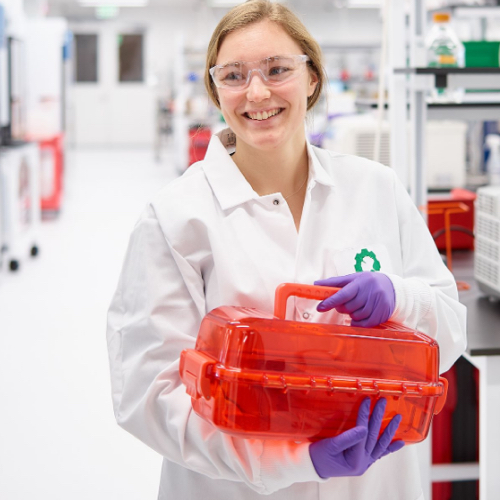Strengthening end-to-end R&D capabilities in gene therapy
Today, we’re excited to announce the acquisition of StrideBio’s adeno-associated virus (AAV) capsid discovery and engineering platform. We will incorporate these capabilities into our end-to-end AAV gene therapy development platform, allowing our customers to leverage new tools to effectively target many different tissue types, and potentially to improve the safety profile of their future gene therapies. We are also receiving StrideBio’s existing library of capsids, which includes advanced candidates extensively tested in large animal models, and which are now available for licensing and broader partnership. Additionally, we will receive the IP and data for StrideBio’s lead preclinical asset for Arrhythmogenic Right Ventricular Cardiomyopathy (ARVC), a rare genetic heart disease, which we plan to sell or outlicense to a commercial partner.
AAV remains the preferred viral vector for gene therapy, used in hundreds of active clinical trials. However, pharmaceutical developers focusing on AAV still face challenges pertaining to limitations in targeted biodistribution, pre-existing immunogenicity and manufacturability. StrideBio’s STRIVE platform –which uses a structural-engineering approach for generating novel AAV capsids to address these limitations – has produced a library of candidates that includes mature assets with strong evidence demonstrated for both performance and targeting across multiple animal models.
StrideBio’s platform generates capsids that are designed to overcome current limitations of first-generation gene therapies, including reduced seroprevalence, improved tropism for cell types beyond the liver such as those in the central nervous system and muscle tissue, and increased gene transfer efficiency, with the potential for improved safety and reduced doses in the clinic.
Providing R&D services for gene therapy manufacturing across capsid, payload, and cell line optimization
“The StrideBio team has built a deep pipeline of AAV capsids and libraries to address critical challenges facing clinical gene therapy with a focus on reducing vector dose and improving safety by limiting off-target biodistribution,” said Aravind Asokan, Ph.D, who co-founded StrideBio with Pat Ritschel and the late Mavis Agbandje-McKenna. “With Ginkgo’s expertise and scale, we hope to amplify this effort and deploy this platform to the gene therapy industry and ultimately, patients.”
Combining our engineering and discovery capabilities in enzymes, regulatory elements, and capsids enables a holistic approach to designing an AAV gene therapy, so that we can support our partners across the entire process of designing the viral vector. We are thrilled to integrate the STRIVE platform and know-how into our foundry to augment our capabilities in capsid engineering, and we look forward to continuing to expand our existing end-to-end capabilities in AAV discovery and manufacturing.
We’ve significantly expanded our work and capabilities in gene therapy in recent years by acquiring Circularis’ proprietary circular RNA and promoter screening platform, partnering with Biogen to improve AAV manufacturing, and partnering with Selecta Biosciences to develop AAV capsids with altered tropism and immunogenicity. We’ve developed several capabilities which enhance our ability to leverage assets like those in this acquisition, including its ability to efficiently and quickly generate a massive set of candidates for testing, its scaled approach to protein engineering, and its ability to apply sequencing and computational pipelines to accelerate the analysis of capsid effectiveness in tissues of interest.
To discuss how you can benefit from Ginkgo’s biopharma and life science R&D capabilities, sign up for Ginkgo Office Hours to speak with our team today.
Find the full press release here along with all of the latest news from the Ginkgo team.
What will you grow with Ginkgo?
